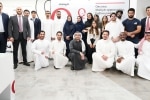Artificial Intelligence (AI) is well on its way to becoming a transformative force in the Gulf Cooperation Council (GCC). The pace has been further accelerated by the rise of generative AI (GenAI), which is projected to be a $24 billion market in the GCC by 2030. However, the region’s stakeholders will need to play catch-up to unlock AI’s full potential.
A range of factors must be in place to create a thriving AI ecosystem that supports innovation. Currently, the region faces obstacles in three areas.
Elevating the region’s AI ecosystem will require targeted action by the region’s private and public sectors across these three areas.
GCC tech champions must adopt an interoperable infrastructure that seamlessly connects both Eastern and Western technologies to ensure adaptability, scalability, and resilience in an ever-evolving tech landscape. They could address chip shortages either by sourcing from alternative vendors or using cloud services that offer graphic processing unit (GPU) “as a service.”4 Companies also need to strengthen their data privacy measures to give customers confidence in how data is handled—for instance, by building gateway LLM architectures that use enterprise datasets in a secure and effective way. Regional tech leaders can bridge talent gaps through global acquisitions and deploy low-code, no-code, and generative-code tools to empower a broader talent pool.
Meanwhile, regional governments can help remove obstacles to the ecosystem’s development. To ensure the GCC has the necessary infrastructure, they could craft policies and incentives supporting investment in critical hardware and the establishment of HPC data centers to meet local demand. Regional governments could also aggregate national data and make it available for companies to train and fine-tune LLMs.
Given broader concerns about the accuracy and reliability of AI models, regional policymakers must take a holistic approach to regulating the use of AI. They will need to strike a balance among competing priorities. For example, setting policies and frameworks that govern data privacy, copyright, and IP without stunting innovation in AI application development could improve the ability of both local tech champions and the region to promote adoption. One path would be for government leaders to participate in setting global tech and AI standards rather than simply following them. Last, they could reimagine the education ecosystem, from K-12 to university, to produce a sufficient supply of data scientists, experts, and tech leaders.
The AI landscape is evolving quickly, fueled by seemingly continuous advancements in GenAI. The GCC could be well positioned to capture its share of the market—if private companies and public sector leaders can move forward collaboratively and with a sense of urgency to support growth and innovation.
This article originally appeared in Arab News, June 2024.























Menu